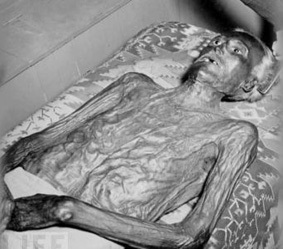Death Stories: The George Mummy, Part 1

This piece originally appeared, in a much shorter form, in Oklahoma Today. As with "Slice," I was sorry to have to leave out so much weird and interesting material to fit it into the magazine.
The George Mummy
My ashes, as the phoenix, may bring forth
A bird that will revenge upon you all.
William Shakespeare
A cold rain is falling in Enid, Oklahoma. Inside Garfield Furniture, customers bustle, their shoes squeaking on the burnished wood floor. I seem to be the only one waiting to see the Death Room. When there's a lull in the trade, the proprietor greets me and guides me up a narrow staircase.
A century ago the furniture store was a hotel, and on the second floor its honeycomb of tiny rooms is mostly intact, and mostly crammed with excess inventory. He takes me into the Death Room, the walls of which are covered with tatters of turn-of-the-century wallpaper. In this narrow cell--maybe six feet wide, with walls reaching far short of the ceiling--the furniture is a century old, but set up as if for living--an iron bedstead with a thin mattress, a wash stand and basin, a table and hard-backed chair.
An array of photocopied documents covers the bed: insurance maps showing the location of the town's businesses ninety-six years ago, a handwritten will, newspaper clippings, and a photograph of a mummified corpse sitting in a chair, eyes wide, with a newspaper spread in its lap.
The proprietor tells the story.
*
In 1903, Oklahoma was not yet a state. The town of Enid, a city on the plains of north central Oklahoma which now has a population of 45,000, was then a decade old, having formed literally overnight in a land run. It was an agglomeration of red cedar and pine buildings leaning on each other's shoulders, the land just beginning to be marked out from the surrounding prairie by lawns and hedges. The Old West may have been dying out, but in the Oklahoma Territory there were still long-riding outlaws with names like Rattlesnake Jim and Dynamite Dick. The Pulitzer Prize-winning historian Marquis James, who was a boy in Enid at the time, remembered being brought to the jail to shake hands with a dying killer named Dick Yeager.
James described the settlers of this " ancestorless country" as "people who for one reason or another had lost out, been run out or weren't doing well enough to suit themselves in the places they came from"--debtors, wanted men, elopers, men escaping paternity suits, itinerant printers forced out of the cities by the coming of the linotype, laborers rushing from town to town with the building booms. It was bad manners to ask about a man's past here. Most of the transitory populace lived in hotel rooms like the one I'm standing in, rooms more like horse stalls than human habitations.
Among the apparently rootless men of Enid in January 1903 was a sixtyish man who had been in town for only a few weeks. He had registered at the Grand Avenue Hotel under the name David E. George. In his three weeks in Enid, he had already run up tabs at several bars and hocked his watch for whiskey. His most successful gambit for getting drinks without cash was to recite poetry and passages of Shakespeare. ("It may have sounded like Shakespeare to the men in the saloons who heard it," one resident said decades later. "But we didn't know much of Shakespeare in Oklahoma Territory in those days.")
Richard:
My eye's too quick, my heart o'erweens too much,
Unless my hand and strength could equal them.
Then, since this earth affords no joy to me,
But to command, to cheque, to o'erbear such
As are of better person than myself,
I'll make my heaven to dream upon the crown.
William Shakespeare
George was given to "bouts of melancholy" when he drank and did morphine or opium. In those days you could buy morphine over the counter along with your monthly supply of Electric Bitters or Dr. Thatcher's Liver & Blood Syrup. He had recently told the proprietor of the Grand Avenue Hotel not to trouble with his body if he were found dead some day, but to toss it out the back door.
Early one morning George bought enough arsenic to kill a troublesome dog several times over. Everyone in the neighborhood, including the druggist's clerk, had heard the dog in question baying all night. George claimed he would ease everyone's sleep.
Back in his room, he swallowed the arsenic himself. A large dose of arsenic is a painful way to die. George's cries roused the house. His door was locked, but two men boosted a third over the transom into his room. The men found George convulsing on the bed. By the time a doctor arrived, George had lapsed into a coma. Soon he was dead.
His body was taken to W. B. Penniman's mortuary and furniture store. Two days later, Penniman's assistant was at work on the body when a couple named Harper came in. Before moving to Enid, the Harpers had lived in the nearby town of El Reno, where they had known George. Mrs. Harper said George had tried to kill himself with an overdose of morphine once before. Believing himself on his deathbed, he had told Mrs. Harper he was John Wilkes Booth, the man who killed Lincoln.
Soon others came forward with similar stories. A legend was born.
Published on September 27, 2011 09:11
No comments have been added yet.



